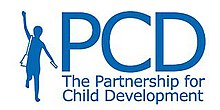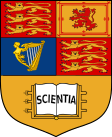Partnership for Child Development
 | |
| Founded | 1992 |
|---|---|
| Focus | School Health & Nutrition, Poverty reduction |
| Location | |
| Origins | University of Oxford |
Area served | Global |
| Method | Capacity building, knowledge dissemination, building the evidence base and building global partnerships. |
| Website | http://www.imperial.ac.uk/partnership-for-child-development |
The Partnership for Child Development (PCD) is a research and technical assistance group based at Imperial College London that seeks to improve health and nutrition in school-age children and youth in low-income countries, thereby improving their education outcomes. PCD was formed in 1992 at the University of Oxford to bridge gaps between academia, funding bodies and the education and health sectors in low-income countries.[1]
History
[edit]Based on a growing evidence base for the beneficial nature of antihelminthic treatment (deworming) in the early 1990s, the Partnership for Child Development was formed by the United Nations Development Programme and the Rockefeller Foundation within the Scientific Coordinating Centre at the University of Oxford.[2] PCD is now based within Imperial College London's Department of Infectious Disease Epidemiology, in St Mary's Hospital, London, funded by international development organisations including the World Bank and the Bill and Melinda Gates Foundation.[3]
Organisational focus
[edit]PCD supports low-income countries to meet their school health needs using the findings of evidence-based research. PCD is a knowledge-based institution which creates and shares information. Core health interventions that PCD supports are school feeding & nutrition, deworming, water and sanitation, disability screening, and health education.[4]
It conducts operational research showing how interventions can be implemented and evaluated at the country level, for example enabling mass treatment of children for common infections such as hookworm and bilharzia.[5] PCD also facilitates the sharing of knowledge between academia, governments and agencies at both national and international level, through web sites, mailing lists, and a global network of partners. In recent years, a major focus of this work has been assisting educators and health professionals to work together to help schools respond to the threat that HIV/AIDS poses to education, as well as supporting governments to better target orphans and vulnerable children in their child health programming.[6][7]
A major function of PCD is capacity building, by means of courses and workshops for governmental and non-governmental staff in developing countries. These include annual training courses in school-based health, nutrition in sub-Saharan Africa and Asia in partnership with local academic organisations such as Mahidol University, the University of Ghana, and the Kenya Medical Research Institute.[8][9]
PCD are a core member of FRESH (Focusing Resources on Effective School Health), an inter-agency initiative that the group jointly developed with WHO, UNICEF, UNESCO, and the World Bank. This initiative is a key guiding strategy for PCD's development work.[10]
References
[edit]- ^ Nokes C (1996), Journal of Biosocial Science [1] A healthy body and a healthy mind? : The relationship between ill-health and cognitive function in school-age children. Accessed 28 March 2012.
- ^ "A. Cerami & K.S. Warren, Drugs, Parasitology Today, Vol. 10" (PDF). Elsevier. Retrieved 17 September 2014.
- ^ Bundy, Donald. Rethinking School Health: A Key Component of Education for All (1st ed.). World Bank. p. 84.
- ^ "New NTD Data to Inform Large Scale Deworming in Ethiopia". The Communication Initiative. Retrieved 18 September 2014.
- ^ Jamison, D. T., J. G. Breman, A. R. Measham, G. Alleyne, M. Claeson, D. B. Evans, P. Jha, A. Mills, and P. Musgrove. Disease Control Priorities II. Oxford University Press. p. Chapter 58. Archived from the original on 23 January 2013. Retrieved 17 September 2014.
((cite book)): CS1 maint: multiple names: authors list (link) - ^ "Measuring the education sector response to HIV and AIDS" (PDF). UNESCO. UNESCO, Paris. Retrieved 17 September 2014.
- ^ Skovdal, M (2014). "Acceptability of conditions in a community-led cash transfer programme for orphaned and vulnerable children in Zimbabwe". Health Policy and Planning. 1–9 (7): 809–17. doi:10.1093/heapol/czt060. PMC 4186208. PMID 24019380.
- ^ "Report of the 2nd Training Course on School Health and Nutrition Programmes in Asia" (PDF). Mahidol University, Faculty of Tropical Medicine. Retrieved 18 September 2014.
- ^ "UNAIDS Inter-Agency Task Team (IATT) on Education Member Activities" (PDF). UNESCO. Retrieved 18 September 2014.
- ^ "The FRESH M&E Framework A Generic Framework for Monitoring and Evaluation of School Health Interventions" (PDF). World Bank. World Bank, Washington D.C. Retrieved 18 September 2014.
Further reading
[edit]- Jamison, D. T., J. G. Breman, A. R. Measham, G. Alleyne, M. Claeson, D. B. Evans, P. Jha, A. Mills, and P. Musgrove, ed. 2006. Disease Control Priorities in Developing Countries, 2nd ed. New York: Oxford University Press. [2]
External links
[edit]| Academics |
| ||||||||||
|---|---|---|---|---|---|---|---|---|---|---|---|
| |||||||||||
| Affiliates | |||||||||||
Text is available under the CC BY-SA 4.0 license; additional terms may apply.
Images, videos and audio are available under their respective licenses.

